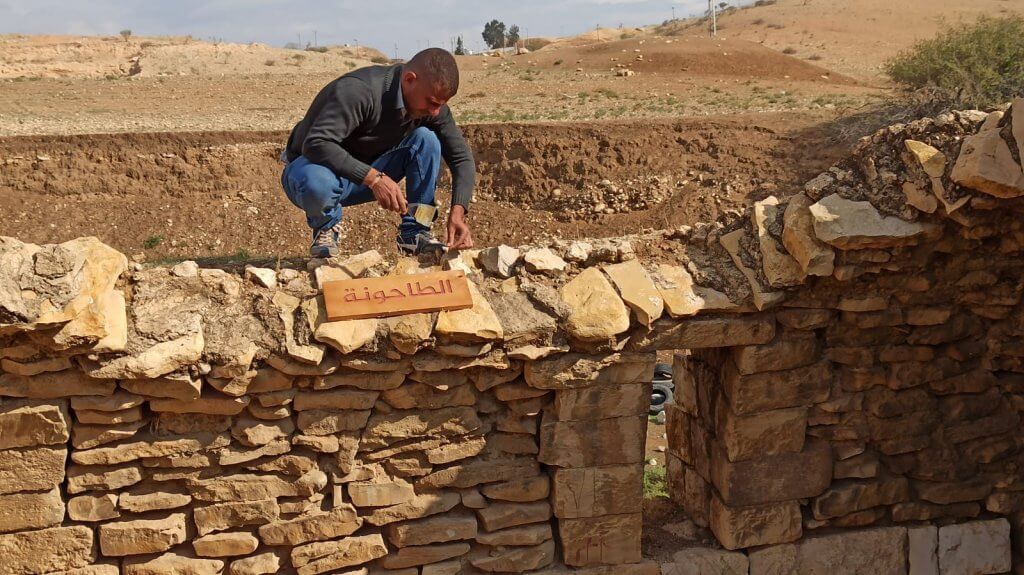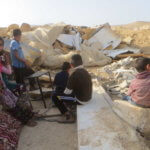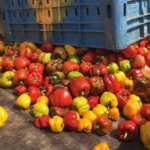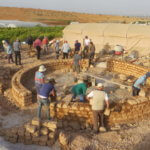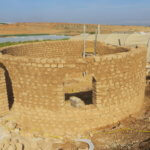Cycle 48 in the Jordan Valley
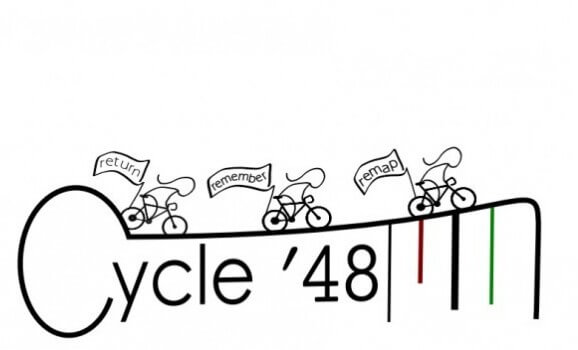 Thank you to Cycle 48 for coming to spend some time in the Jordan Valley. This post originaly appeared on https://cycle48.wordpress.com
Thank you to Cycle 48 for coming to spend some time in the Jordan Valley. This post originaly appeared on https://cycle48.wordpress.com
“You couldn’t find a better place to go on holiday?” The soldier tried to joke with me as he looked at my passport when I passed through the checkpoint. I ignored him, in my head thinking it would be one of the best places to go on holiday if only him and his army pals would bugger off.
It really would be! Cycling to the Jordan Valley from Jenin was a dream. Friendly faces offering me water and delicious falafel, spectacular scenery and golden sunshine. It was only sights of Israel’s very active colonisation which dampened my soaring spirits.
 I arrived in Fasiyel (a Palestinian village in the central Jordan Valley) in good time, but a bit unsure as to what to do next… I didn’t really fancy putting my tent up just anywhere – Area C is now covered with army outposts and settlements. I thought I would just ask in the village if I could pitch up by someone’s house. But first things first – bread and humous took priority.
I arrived in Fasiyel (a Palestinian village in the central Jordan Valley) in good time, but a bit unsure as to what to do next… I didn’t really fancy putting my tent up just anywhere – Area C is now covered with army outposts and settlements. I thought I would just ask in the village if I could pitch up by someone’s house. But first things first – bread and humous took priority.
As I munched on a late lunch outside the shop, many curious kids and adults approached. Not much English spoken, but I repeated that I loved Palestine (one of the first phrases I learnt in Arabic) – desperate to convey as soon as possible that I wasn’t a settler! Soon I met Abed, who spoke a little more English, ‘where will you stay tonight?’ he asked. ‘Well,’ I said, ‘I have a tent, I was wondering if it’s OK to put it up in the village somewhere?’ He looked aghast. ‘No, no, no! You will stay with in our home!’
Over the course of the evening I drank around a gallon of sweet bedouin tea, as I visited various members of Abed’s wonderful, gigantic family! It was very special. The evening ended by rolling vine leaves with rice, ready for lunch tomorrow. I felt completely blessed to get this beautiful insight into village life here in the Jordan Valley, and was smiling from ear to ear.
 In the morning, Abed’s sister Fatima took me to her favourite spot in the garden – where she starts each day by smelling the flowers and drinking tea in the morning sun.
In the morning, Abed’s sister Fatima took me to her favourite spot in the garden – where she starts each day by smelling the flowers and drinking tea in the morning sun.
Having fallen in love with the Jordan Valley, received the warmest welcome from its inabitants, and feeling blown away by the hills, it has been particularly difficult to absorb the ugly truth about what’s happening here.
One month ago, we visited villages whose inhabitants were forced to flee by Zionist militias – through violence and fear 78% of Palestine was ethnically cleansed, in the space of around 18 months. Today, here in the Jordan Valley, the process is slower, but no less brutal. Violence and fear are just two tactics amongst dozens which Israel is currently employing to remove the Palestinian population. Unable to use the pretense of a war (as in 1948), families have not been forced out at gunpoint; they have, however, had their water sources stolen, had their livelihoods destroyed, and their homes demolished.
 ‘The Zionist line is that they “make the desert bloom”, but they are doing completely the opposite. They have made the breadbasket of Palestine into a desert!’ Rasheed, who coordinates the Jordan Valley solidarity campaign, told us.
‘The Zionist line is that they “make the desert bloom”, but they are doing completely the opposite. They have made the breadbasket of Palestine into a desert!’ Rasheed, who coordinates the Jordan Valley solidarity campaign, told us.
Since Israel started occupying this region in 1967, the population has decreased dramatically. Traditionally a heavily cultivated area, when Israel began its policies of stealing water, preventing Palestinians from accessing their springs, and digging deep wells so as to deprive the shallower Palestinian ones of water, the farmers of the Jordan Valley had little choice but to move.
There are many families, however, who are determined to withstand anything that is thrown their way. ‘Sumoud’ (steadfastness) is often said to characterise the Palestinian people, and it is certainly the case here.
 Abu Saqeer has watched the Israeli army demolish his home, and those of his neighbours, many times. ‘I don’t have the power to prevent them, so I’m not going to give them the satisfaction of seeing me sad or annoyed. I sit calmly with a cup of tea and watch them’, he tells us.
Abu Saqeer has watched the Israeli army demolish his home, and those of his neighbours, many times. ‘I don’t have the power to prevent them, so I’m not going to give them the satisfaction of seeing me sad or annoyed. I sit calmly with a cup of tea and watch them’, he tells us.
When asked if there is any pattern to when they come to demolish, Abu Saqeer says that during winter it is always right before a spell of particularly cold weather comes in. And during summer it is always the hottest days, when you are desperate for shelter, that they come with their bulldozers.
His message is clear though – ‘no matter how much you demolish, I will never leave this land’.
 As he speaks, gunfire from a nearby Israeli army training base mingles with the bleating goats and sheep. A military plane roars above us for good measure.
As he speaks, gunfire from a nearby Israeli army training base mingles with the bleating goats and sheep. A military plane roars above us for good measure.
Groups such as the Jordan Valley Solidarity Campaign aim to support these steadfast communities, by helping build mud brick houses, schools, and clinics. These environmentally friendly bricks make buildings that stay warm in winter and are cool in summer.
If not thirst, parched land, or a bulldozed home, I think the injustice of it all would send me over the edge.
 Palestinian communities in the Jordan Valley have water pipes running through their villages and under their homes, to provide the nearby settlements and army bases with water that has been stolen from them, but from which they are no longer allowed to touch. Instead they are forced to buy water at inflated prices, and fund the occupation that oppresses them. According to Amnesty International research, 9,400 Israeli settlers use 6.6 times more water than the 65,000 Palestinian living in the Jordan Valley.
Palestinian communities in the Jordan Valley have water pipes running through their villages and under their homes, to provide the nearby settlements and army bases with water that has been stolen from them, but from which they are no longer allowed to touch. Instead they are forced to buy water at inflated prices, and fund the occupation that oppresses them. According to Amnesty International research, 9,400 Israeli settlers use 6.6 times more water than the 65,000 Palestinian living in the Jordan Valley.
This is apartheid in action.
Israel’s flagrant abuse of international law and disregard for human rights are dangerous for us all. Palestinians in the Jordan Valley are a beautiful example of how to resist, and how to be human – despite living daily with such injustice they are open, kind and generous to fellow humans (particularly if you arrive by bicycle I think!)
Just staying on their land is an amazing feat of courage, determination, and resilience but its time the playing field was leveled. The international community must stop arming Israel; we encourage everyone to join the movement for Boycott, Divestment & Sanctions until Israel starts abiding by international law, and valuing human rights.

